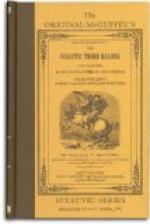7. And then came the more subtle temptation, “shall I not be showing myself braver than others by doing this? Have I any right to begin it now? Ought I not rather to pray in my own study, letting other boys know that I do so, and trying to lead them to it, while in public, at least, I should go on as I have done?” However, his good angel was too strong that night, and he turned on his side and slept, tired of trying to reason, but resolved to follow the impulse which had been so strong, and in which he had found peace.
8. Next morning he was up and washed and dressed, all but his jacket and waistcoat, just as the ten minutes’ bell began to ring, and then in the face of the whole room he knelt down to pray. Not five words could he say,—the bell mocked him; he was listening for every whisper in the room,—what were they all thinking of him?
9. He was ashamed to go on kneeling, ashamed to rise from his knees. At last, as it were from his inmost heart, a still, small voice seemed to breathe forth the words of the publican, “God be merciful to me a sinner!” He repeated them over and over, clinging to them as for his life, and rose from his knees comforted and humbled, and ready to face the whole world.
10. It was not needed: two other boys besides Arthur had already followed his example, and he went down to the great school with a glimmering of another lesson in his heart,—the lesson that he who has conquered his own coward spirit has conquered the whole outward world; and that other one which the old prophet learned in the cave at Mount Horeb, when he hid his face, and the still, small voice asked, “What doest thou here, Elijah?”—that however we may fancy ourselves alone on the side of good, the King and Lord of men is nowhere without his witnesses; for in every society, however seemingly corrupt and godless, there are those who have not bowed the knee to Baal.
[Transcriber’s Footnote: Baal—Various fertility and nature gods of the ancient Semitic peoples considered to be false gods by the Hebrews.]
11. He found, too, how greatly he had exaggerated the effect to be produced by his act. For a few nights there was a sneer or a laugh when he knelt down, but this passed off soon, and one by one all the other boys but three or four followed the lead.
Definitions.—l. Leav’en, to make a general change, to imbue. 4. Loathed, hated, detested. Brag’gart, a boaster. 5. Vow’ing, making a solemn promise to God. Tes’ti-mo-ny, open declaration. 6. Fal’tered, hesitated. Mo’tive, that which causes action, cause, reason. 7. Sub’tle (pro. sut’l), artful, cunning. Stud’y, a private room devoted to study. 10. Glim’mer-ing, a faint view.
Notes.—1. Arnold’s. Dr. Thomas Arnold was head master at Rugby nearly fifteen years. His influence on the character of the boys was very marked, and soon made the school celebrated throughout England. The Schoolhouse was the name of one of the numerous buildings belonging to Rugby.




